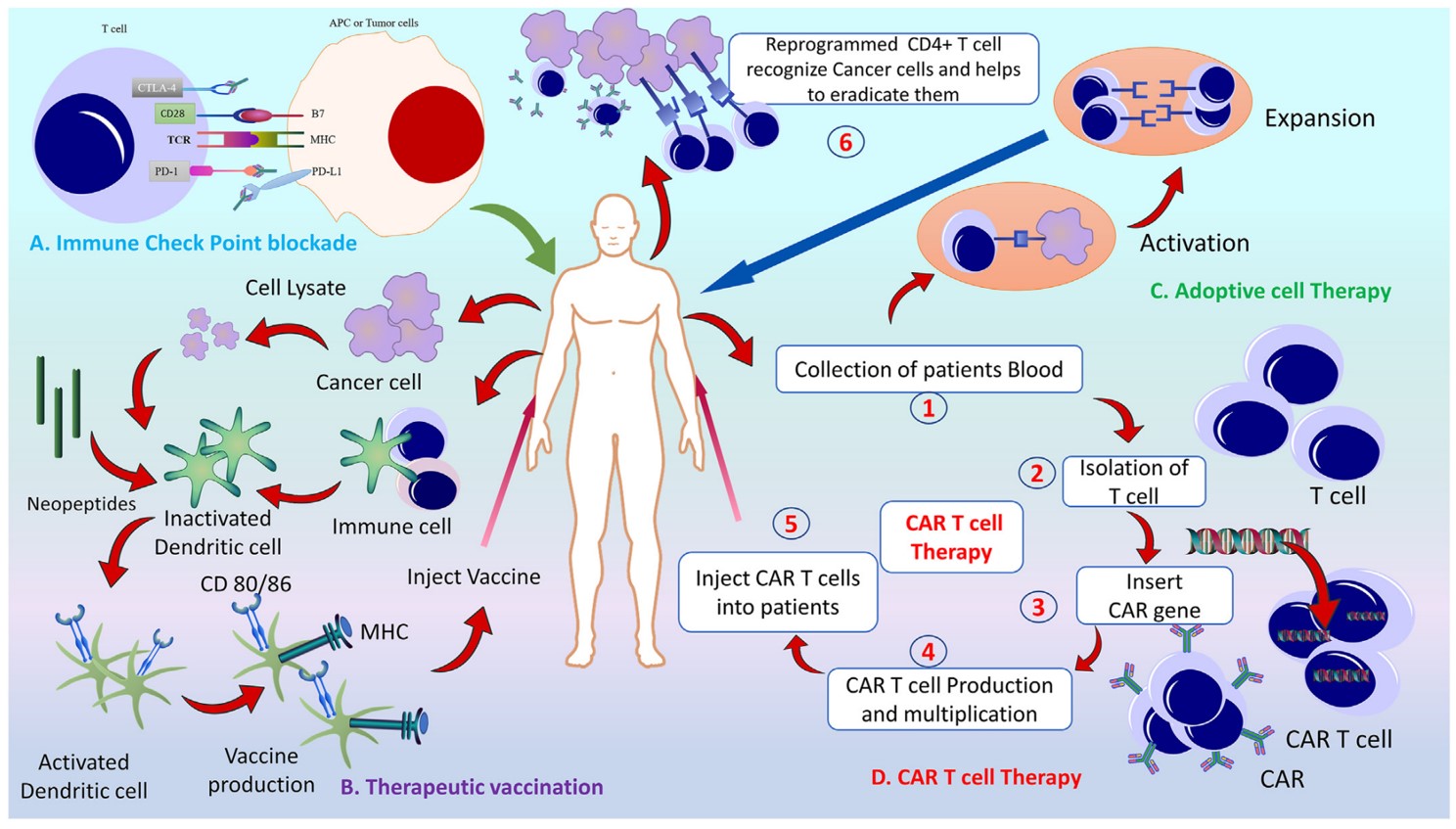T cells are essential for adaptive immunity, eliminating infections and aberrant cells. Their activation is based on intricate interactions with antigen-presenting cells. Nowadays, biomaterials research has led to the development of artificial platforms that imitate this mechanism. These platforms can improve T cell treatments by activating them outside the body before infusion or by stimulating them directly within the patient. This strategy shows great potential for improving T-cell treatments by conserving their potency and intended function, eventually advancing the field of cell-based immunotherapies.
 Fig.1 A prospective cancer immunotherapy method based on CD4+ T cells.1
Fig.1 A prospective cancer immunotherapy method based on CD4+ T cells.1
Creative Biolabs provides a range of artificial T cell-stimulating platform services to develop stimulators that mimic the natural activation process of T cells, enhancing the effectiveness of T cell therapies. Leveraging our extensive expertise and experience, we assist in designing and developing a variety of artificial T cell stimulation platforms. Our services also include optimizing existing platforms by enhancing T cell activation efficiency, controlling stimulation duration, and minimizing potential side effects. Moreover, we are capable of customizing artificial T cell stimulation platforms to meet specific therapeutic needs, such as targeting specific T cell subsets or delivering particular payloads alongside the activation signal. To evaluate the safety and efficacy of the platforms, we will conduct thorough preclinical studies that include in vivo studies and in vitro studies. Based on our robust platforms, we are confident in our ability to deliver high-performing artificial T cell-stimulators within our customers' expected timeframes.
| Artificial T Cell Stimulator Development Services | Hydrogel-based Artificial T Cell-Stimulating Platform Development Services |
| Artificial T cell stimulators are versatile, adaptable particles designed to interact effectively with T cells, thus enhancing T cell therapies and facilitating research into fundamental T cell immune responses. Our tailored solutions provide advanced engineering of artificial T cell stimulators to closely resemble the function and behavior of natural antigen-presenting cells, ensuring high efficiency and specificity in immune modulation. | Hydrogels, biocompatible water-swollen polymer networks, offer a promising platform for creating artificial T cell stimulators. Their resemblance to natural tissues provides a conducive environment for cell growth and interaction. At Creative Biolabs, we offer comprehensive services encompassing the development, optimization, evaluation, and custom design of high-performance hydrogel-based platforms to effectively stimulate T cells for advanced immunotherapies. |
| DNA-based Artificial T Cell-Stimulating Platform Development Service | Alternative Polymeric-based Artificial T Cell-Stimulating Platform Development Service |
| Our services utilize DNA-based platforms to engineer precisely controlled and highly customizable artificial T cell stimulators. By incorporating DNA into the platform structure, we can dynamically alter its physical properties and create intricate 3D architectures that mimic the natural T cell microenvironment. | We also provide a service to generate innovative artificial T cell stimulatory platforms using alternative polymer materials, which feature diverse scaffold topologies, varying degrees of flexibility, and distinct surface functionalization. We aim to overcome the challenges of ensuring consistent reproducibility, preserving specific structures, and managing in vivo degradation that are often encountered with other artificial T cell stimulation technologies. |
| Soluble Artificial T Cell-Stimulating Platform Development Service | Artificial T Cell-Stimulating System Function Characterization Services |
| Our established soluble T cell-stimulating platforms provide an alternative approach to activating T cells, eliminating the need for complex physical scaffolds or intricate structures. This approach leverages soluble reagents, such as precisely defined cocktails of antibodies and cytokines, to effectively mimic the physiological signals required for robust T cell activation and expansion. | We offer thorough characterization services for artificial T cell-stimulating systems development, involving their ability to effectively activate T cells, control T cell differentiation, and maintain T cell quality, and safety insurance. This rigorous assessment of key functional parameters is essential to translate these innovative platforms into successful and clinically viable immunotherapies. |
Q1: What are the key benefits of using artificial T cell-stimulating platforms?
A1: Artificial T cell-stimulating platforms offer numerous advantages, including enhanced and more consistent T cell activation compared to traditional methods, controlled differentiation towards desired effector subsets, improved T cell quality, increased consistency and reproducibility, versatility for tailoring to specific therapeutic needs, and ultimately, accelerated development and clinical translation of novel T cell therapies.
If you are interested in our artificial T cell-stimulating platform development services, please feel free to get in touch with us.
Reference
For any technical issues or product/service related questions, please leave your information below. Our team will contact you soon.
All products and services are For Research Use Only and CANNOT be used in the treatment or diagnosis of disease.
 NEWSLETTER
NEWSLETTER
The latest newsletter to introduce the latest breaking information, our site updates, field and other scientific news, important events, and insights from industry leaders
LEARN MORE NEWSLETTER NEW SOLUTION
NEW SOLUTION
CellRapeutics™ In Vivo Cell Engineering: One-stop in vivo T/B/NK cell and macrophage engineering services covering vectors construction to function verification.
LEARN MORE SOLUTION NOVEL TECHNOLOGY
NOVEL TECHNOLOGY
Silence™ CAR-T Cell: A novel platform to enhance CAR-T cell immunotherapy by combining RNAi technology to suppress genes that may impede CAR functionality.
LEARN MORE NOVEL TECHNOLOGY NEW SOLUTION
NEW SOLUTION
Canine CAR-T Therapy Development: From early target discovery, CAR design and construction, cell culture, and transfection, to in vitro and in vivo function validation.
LEARN MORE SOLUTION